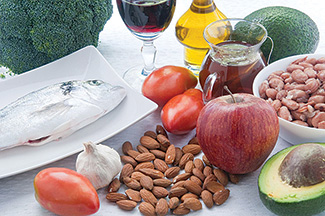How to naturally lower your cholesterol
 With so much information out there about cholesterol, it can get confusing. One thing is clear, though: High levels of low-density lipoprotein, or LDL (sometimes known as “bad” cholesterol), can increase your risk of heart attack, stroke and other health concerns. So, it’s important you keep that LDL under control.
With so much information out there about cholesterol, it can get confusing. One thing is clear, though: High levels of low-density lipoprotein, or LDL (sometimes known as “bad” cholesterol), can increase your risk of heart attack, stroke and other health concerns. So, it’s important you keep that LDL under control.
Cleveland Clinic preventative cardiologist Leslie Cho, MD, shares some proven ways to naturally lower cholesterol and to keep it in a healthy range so you can live your best life.
Can you lower cholesterol without medication? “There are ways to manage high cholesterol, and the wonderful news is that heart disease is 90 percent preventable,” Dr. Cho says. “Even if you have a significant family history of high cholesterol, you can prevent heart disease.”
If you have coronary artery disease or carotid artery disease, your doctor may recommend that you pair healthy lifestyle habits with cholesterol-lowering medications, which can work wonders.
But nearly everyone can benefit from learning about healthy lifestyle choices that can lower cholesterol the natural way, including diet, exercise and stress management. Here are the best ways to lower your cholesterol and reduce your risk of heart disease.
LIMIT FATS
First things first — diet is one of the most important risk factors for developing high cholesterol. You can lower your cholesterol by limiting the type of foods you eat.
CONSUME MOSTLY HEALTHY FATS
To try lowering your cholesterol naturally, start by replacing unhealthy (saturated) fats with healthy fats (monounsaturated and polyunsaturated). Healthy fats are found in foods like:
- Avocados
- Nuts, like walnuts and almonds
- Oily fish high in omega-3 fatty acids, like tuna, salmon and mackerel
- Olive oil
- Seeds, including flax seeds and chia seeds
LIMIT SATURATED FATS
It’s also important to limit your saturated fat intake. This means becoming a food label reader. There should be no more than two grams of fat per serving, and it should account for less than seven percent of your daily calorie intake.
Saturated fats are most often found in:
- Animal products like beef, pork, chicken skin and hot dogs.
- Cooking oils like palm oil and coconut oil.
- Full-fat dairy, like cheese and butter.
ELIMINATE TRANS FATS
Trans fats are found in many pre-packaged foods, especially sweets and snacks. And beware of your favorite fried foods, which are loaded with this kind of fat.
Trans fats have a very negative impact on the body. Not only do they worsen your cholesterol, but they also increase your markers of inflammation. This can lead to inflamed blood vessels, a risk factor for heart attacks.
GO PLANT-BASED
To lower your cholesterol levels, try cutting out red meat and shellfish, which can raise your cholesterol levels. The best way to lower your cholesterol is to switch to a plant-based diet while still trying to maintain variety. Beans, legumes and spinach are just a few of the foods that can lower cholesterol while still providing lots of protein.
If you’re not ready to go fully plant-based, that’s OK. The cholesterol found in oily fish can also be part of a heart-healthy diet that lowers your cholesterol. Aim for two servings per week of salmon, tuna, sardines, mackerel or herring.
INCREASE YOUR FIBER
Ideally, you should be getting 25 to 35 grams of fiber a day. Fiber binds to cholesterol and eliminates it from your body. To increase your fiber intake, eat more whole grains, legumes like beans and lentils, vegetables and fruits. You should be getting a good mix of both soluble fibers, which are more beneficial for cholesterol, and insoluble fibers, which are better for your gut health. Getting enough fiber also reduces your risk of diseases, prevents constipation and keeps you feeling full for longer.
GET SOME EXERCISE
Exercise can have a dramatic effect on your cholesterol, namely by raising your “good” cholesterol (high-density lipoprotein, or HDL) and lowering your triglycerides.
The American Heart Association recommends getting at least two and a half hours of physical activity a week.
Exercise may also help you lose weight, which has an effect on cholesterol. “If you lose even a small amount of weight, your HDL will go up and your LDL will come down,” Dr. Cho says. “Losing five to 10 pounds can lower your total cholesterol by five to 10 percent.”
Vitamins and supplements that can lower cholesterol
Remember that pills should be a supplement to, not a substitute for, a good diet. If you’re trying to lower your cholesterol, ask your doctor about the following options.
• Psyllium: This bulk-forming fiber laxative, which is sold over the counter (like Metamucil), finds cholesterol and eliminates it from your body. Two grams a day can lower your cholesterol.
• Red yeast rice: Taking 1,200 milligrams twice a day may lower your cholesterol, but it’s critical that you talk to your doctor before taking it. You’ll need to have your liver function monitored.
• Phytosterols: Phytosterol is similar to your body’s natural cholesterol and can block cholesterol from being absorbed into your body. Two grams of phytosterol a day can lower your cholesterol by 10 percent and your LDL by 14 percent.
You may hear about garlic and grapeseed and other ways to lower your cholesterol, but these ingredients won’t impact your cholesterol, so save your money for something good — like sneakers so you can go exercise.
If you’ve spent about six months trying to adopt healthier lifestyle habits but still aren’t seeing a change in those cholesterol numbers, it’s time to talk to your doctor. They can provide specialized guidance specific to your health, and they may be able to prescribe you medication to help, as well.



Leave a Reply